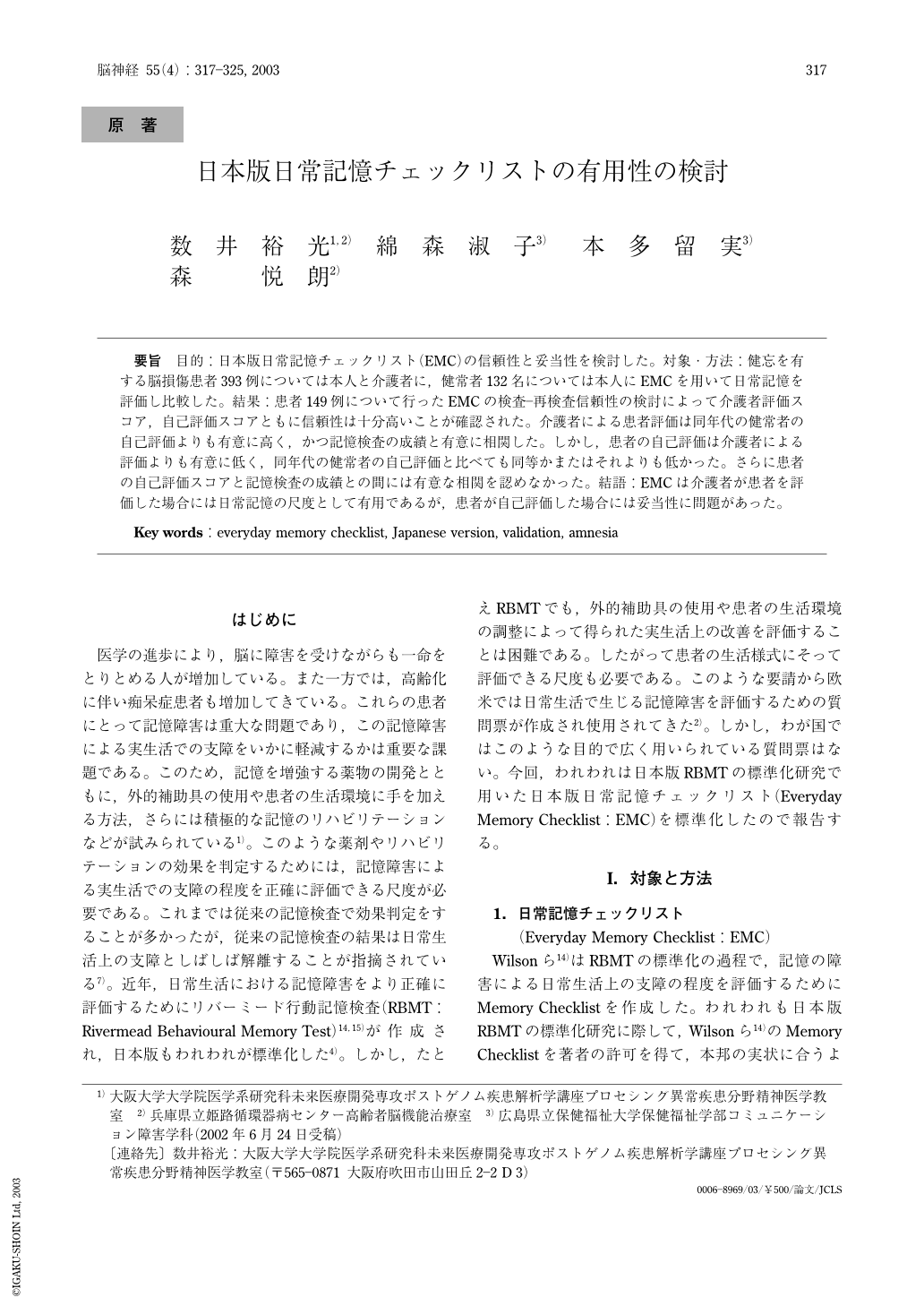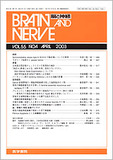Japanese
English
- 有料閲覧
- Abstract 文献概要
- 1ページ目 Look Inside
要旨 目的:日本版日常記憶チェックリスト(EMC)の信頼性と妥当性を検討した。対象・方法:健忘を有する脳損傷患者393例については本人と介護者に,健常者132名については本人にEMCを用いて日常記憶を評価し比較した。結果:患者149例について行ったEMCの検査-再検査信頼性の検討によって介護者評価スコア,自己評価スコアともに信頼性は十分高いことが確認された。介護者による患者評価は同年代の健常者の自己評価よりも有意に高く,かつ記憶検査の成績と有意に相関した。しかし,患者の自己評価は介護者による評価よりも有意に低く,同年代の健常者の自己評価と比べても同等かまたはそれよりも低かった。さらに患者の自己評価スコアと記憶検査の成績との間には有意な相関を認めなかった。結語:EMCは介護者が患者を評価した場合には日常記憶の尺度として有用であるが,患者が自己評価した場合には妥当性に問題があった。
We developed a Japanese version of the Everyday Memory Checklist(EMC), which was originally made by Wilson et al. to assess everyday memory problems, and examined its reliability and validity in assessing brain-damaged patients with memory deficits.
Subjects and Methods:The subjects consisted of 393 brain-damaged patients with memory deficits aged between 17 and 90 years with the mean MMSE of 24.6, and 132 control subjects aged between 19 and 86 years with the mean MMSE of 28.5. Patients' everyday memory problems were both self-evaluated and evaluated by their caregivers, while those of control subjects were only self-evaluated with the EMC.
Results:The test-retest reliability of the EMC evaluated in 149 randomly selected patients was acceptably high with intraclass correlation coefficient(0.950 for caregiver-evaluated scores and 0.759 for self-evaluated scores). The standard memory test scores were significantly correlated with the EMC scores of the patients evaluated by the caregivers;among them the scores of the Rivermead Behavioural Memory Test were most highly correlated with the EMC scores. On the other hand, the scores of the non-memory cognitive test scores were not significantly correlated with the EMC scores. The self-evaluated EMC scores of the patients were significantly lower than those of the patients evaluated by the caregivers, and were not correlated with memory test scores or with non-memory cognitive test scores. As the EMC scores of control subjects over 60 years were significantly higher than the scores of the subjects under 59 years, we compared the EMC scores between the patients and the control subjects after we divided each subject into two groups depending on age. The EMC scores of the patients evaluated by the caregivers were significantly higher than the score of the control subjects in groups of both over 60 years and under 59 years. However, the self-evaluated EMC scores of the patient were not significantly higher than the EMC scores of the control subjects. In the analysis of the diagnostic accuracy, the EMC scores of the patients evaluated by the caregivers correctly classified 40.9% of patients and 92.9% of normal subjects by setting the cut-off scores of 14/15 in subjects under 59 years, and classified 50.2% of patients and 85.5% of normal subjects by setting the cut-off scores of 16/17 in subjects over 60 years.
Conclusion:When caregivers evaluated the amnesic patients, the Japanese version of the EMC is reliable and valid in assessing everyday memory problems.
(Received:June 24, 2002)

Copyright © 2003, Igaku-Shoin Ltd. All rights reserved.


